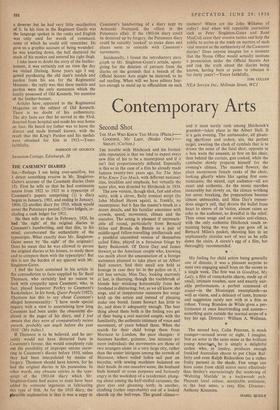THE. CASEMENT DIARIES
S1R,—Perhaps I am being over-sensifive, but I detect something evasive in Mr. Singleton- Gates's account of the Casement diaries (June 15). First he tells us that he had continuous access from 1922 to 1925 to a typescript of Casement's papers comprising (1) a diary begun in January, 1903, and ending in January, 1904; (2) another diary for 1910, which would cover the Putumayo period; (3) two ledgers, in- cluding a cash ledger for 1911.
He then tells us that in February, 1926, he had 'the sight' of the original diaries in Casement's handwriting, and that this, to his mind, corroborated the authenticity of the typescripts. What exactly does Mr. Singleton- Gates mean by 'the sight' of the originals? Does he mean that he was allowed to peruse the original diaries at his leisure, to study them and to compare them with the typescripts? But this is not the burden of my quarrel with Mr. Singleton-Gates.
I find the facts contained in his article in flat contradiction to facts supplied by Sir Basil Thomson, who certainly had no reason to look with sympathy upon Casement, who, in fact, played Inspector Porfiry to Casement's Raskolnikov. In his book, Queer People (1922), Thomson has this to say about Casement's alleged homosexuality: 'I have made special inquiry with a view to ascertaining how long Casement had been under the obsessions dis- closed in the pages of his diary, and I feel certain that they were of comparatively recent growth, probably not much before the year 1910; (My italics.) If Thomson is to be believed, and he cer- tainly would not have distorted facts in Casement's favour, this would completely rule out the possibility of improper entries occur- ring in Casement's diaries before 1910, unless they had been interpolated by means of forgery. Thomson should have known, for he had the original diaries in his possession. In other words, any obscene entries in the type- script of the 1903-04 diary which Mr. Singleton-Gates had access to must have been added by someone ingenious at fabricating this type of filth. As for the 1910 diary, the plausible explanation is that was a copy in Casement's handwriting of a diary kept by Armando Normand, the villain in the Putumayo affair. If the 1903-04 diary could be doctored up by forgery, the Putumayo diary could be suitably 'cooked' to make dates and places seem to coincide with Casement's movements,.
Incidentally, l found the introductory para- graph to Mr. Singleton-Gates's article, apolo- gising for the deletion of extracts from the diaries on, the grounds that a breach of the Official Secrets Acts might be incurred, to be sad reading. When will we have editors fear- less enough to stand up to officialdom on such
matters? Where are the John Wilkeses of today? And when will reputable journalists such as Peter Singleton-Gates and Rene MacColl cease their evasive tactics and help the public to arrive at the truth on matters of such vital interest as the authenticity of the Casement diaries? Does anyone imagine for a moment that the Home Office would actually institute a prosecution under the Official Secrets Act and risk the truth about the diaries being known, having been at pains to obscure it for forty years?—Yours faithfully,
TOM CULLEN
NEA Service Inc., Millman Street, WC1


































 Previous page
Previous page